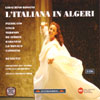Rossini (L') Italiana in Algeri
Everything on paper looks fine but on the night the comedy wasn’t working
View record and artist detailsRecord and Artist Details
Composer or Director: Gioachino Rossini
Genre:
Opera
Label: Dynamic
Magazine Review Date: 4/2007
Media Format: CD or Download
Media Runtime: 0
Mastering:
Stereo
DDD
Catalogue Number: CDS526/1

Tracks:
| Composition | Artist Credit |
|---|---|
| (L')Italiana in Algeri, '(The) Italian Girl in Algiers' |
Gioachino Rossini, Composer
Alex Esposito, Haly, Baritone Barbara Bargnesi, Elvira Bologna Teatro Comunale Orchestra Bruno de Simone, Taddeo, Baritone Gioachino Rossini, Composer José Maria Lo Monaco, Zulma, Soprano Lubomír Mátl, Conductor Marco Vinco, Mustafa, Bass Marianna Pizzolato, Isabella, Soprano Maxim Mironov, Lindoro Prague Chamber Choir |
Author: Richard Osborne
The cast the Pesaro Festival assembled for this 2006 revival of Dario Fo’s extravagantly inventive 1994 production of L’italiana was one with which any house might be happy. The Isabella, Marianna Pizzolato, made her name singing Tancredi at the 2004 festival. She is an able, if as yet slightly one-dimensional, artist who later this year will sing the title-role in a new Welsh National Opera production of La Cenerentola. The young Russian tenore di grazia Maxim Mironov, another favourite with the Pesaro management, is an agreeable Lindoro, though he makes heavy weather of “Concedi, amor pietosa”, the aria Rossini wrote to replace “Oh come il cor di giubilo” in Milan in 1814. After a disastrously bumpy start in the Introduzione, the Mustafà, Marco Vinco, proves to be a useful basso buffo. Add to this the verve and precision of Donato Renzetti’s conducting, first-rate orchestral playing and a splendidly immediate recording (the only irritant the squeal of footwear on stage) and you have the makings of a decent L’italiana.
So why does what comes though the speakers so often seem staid and lacking in comic élan? And why is the audience response so tepid? Did Fo’s over-elaborate production corral the singers and bore the audience? In his marvellous new book Divas and Scholars: Performing Italian Opera (Chicago), Philip Gossett recalls advising Fo’s original Isabella, Jennifer Larmore, on ornamentation: since she already had her hands full with the staging, he had to be “rather parsimonious”. More generally, do today’s singers “characterise” their roles vocally as their predecessors did in the days before “the production” took over? One doesn’t haven’t to go all the way back to Conchita Supervia’s 1927 recordings of “Ai capricci” and “O! che muso” to hear an Isabella “putting the comedy across” in a way Pizzolato doesn’t begin to do. Agnes Baltsa (Abbado) and Marilyn Horne (Scimone), products of the generation before Pizzolato’s, do it pretty well. Both older recordings are preferable to the new one.
So why does what comes though the speakers so often seem staid and lacking in comic élan? And why is the audience response so tepid? Did Fo’s over-elaborate production corral the singers and bore the audience? In his marvellous new book Divas and Scholars: Performing Italian Opera (Chicago), Philip Gossett recalls advising Fo’s original Isabella, Jennifer Larmore, on ornamentation: since she already had her hands full with the staging, he had to be “rather parsimonious”. More generally, do today’s singers “characterise” their roles vocally as their predecessors did in the days before “the production” took over? One doesn’t haven’t to go all the way back to Conchita Supervia’s 1927 recordings of “Ai capricci” and “O! che muso” to hear an Isabella “putting the comedy across” in a way Pizzolato doesn’t begin to do. Agnes Baltsa (Abbado) and Marilyn Horne (Scimone), products of the generation before Pizzolato’s, do it pretty well. Both older recordings are preferable to the new one.
Discover the world's largest classical music catalogue with Presto Music.

Gramophone Digital Club
- Digital Edition
- Digital Archive
- Reviews Database
- Full website access
From £8.75 / month
Subscribe
Gramophone Full Club
- Print Edition
- Digital Edition
- Digital Archive
- Reviews Database
- Full website access
From £11.00 / month
Subscribe
If you are a library, university or other organisation that would be interested in an institutional subscription to Gramophone please click here for further information.




